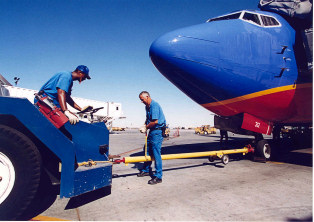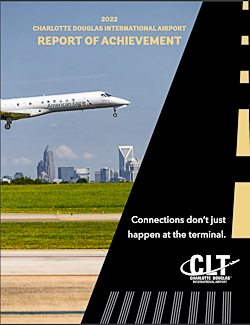Midway Privatization in Final Phase
As the deal to privatize Chicago Midway Airport nears completion, you can almost hear Milton Friedman and Adam Smith high-fiving each other from the grave. If the $2.51 billion, 99-year agreement to lease the airport to a private operating company is finalized in April as anticipated, it will be an industry first and a major test case for free market economics. To date, no large hub airport in the United States has ever been run by a private, for-profit company.
It literally took an act of Congress to create the possibility for a non-governmental business to become a candidate. The 1996 Reauthorization Act established a Federal Aviation Administration pilot program that allows private companies to own, manage, lease or develop up to five U.S. airports. Only one large air carrier airport was allowed to participate; and unlike the general aviation airports participating, it could be leased, but not sold.
Six firms/investment groups responded to the City of Chicago's request for qualifications from private companies interested in assuming management of Midway. In September 2008, it selected the Midway Investment and Development Corporation, a consortium of Citi Infrastructure Investors, Vancouver Airport Services and John Hancock Life Insurance Company.
Felicity Gates, co-head of Citi Infrastructure Investors, refers to the deal as a "groundbreaking transaction."
Final verification of MIDCo's financing and approval by the Committee on Foreign Investment in the United States are said to be the only main hurdles left to be cleared.
Aviation Insider
Vancouver Airport Services clearly provides the aviation expertise and hands-on airport experience in the MIDCo triumvirate. In addition to managing Vancouver International Airport (Canada's second busiest airport) it operates 17 other airports in seven countries around the world. In 2007, its combined passenger traffic exceeded 29 million; total revenues earned throughout its network were $433 million.
In a written statement, a Vancouver Airport Services spokesperson said the company is excited about bringing its "incredible success operating profitable, customer-focused airports" to Chicago.
"This contract marks a milestone in the growth of our company, and is a clear example of how we can leverage our success at home to develop the best airports in the world," says Larry Berg, president and CEO, Vancouver Airport Authority.
Final FAA approval is based on a number of conditions, including MIDCo's ability to prove that it will comply with the City of Chicago's grant obligations, operate the airport safely, continue maintenance and improvements, provide security, mitigate noise and environmental impacts and abide by existing collective bargaining agreements. The city, in turn, must provide a plan for continued operation of the airport if MIDCo declares bankruptcy or otherwise defaults.
Under the provisions of the pilot program, approved private operators are eligible to receive Airport Improvement Program funds, collect Passenger Facility Charges and charge "reasonable fees."
The current agreement proposed at Midway includes 25-year leases for the airlines. Landing fees, rents and other charges would be frozen for the first six years of private operation and tied to the consumer price index thereafter.
 Coming to Terms
Coming to Terms
Before the City of Chicago could solicit offers from private operators, 65% of the airlines operating at Midway (as determined by the number of carriers and landed weight) had to give their approval. In essence, they had veto power. Southwest Airlines, with approximately 76% market share at Midway, was a key constituent.
The city, however, chose an opportune time to seek the airlines' approval, notes Pete Houghton, director of Properties for Southwest Airlines. "With increased costs and a slowdown in traffic throughout the system, predictability of what costs will be to operate at a given airport is a good thing."
 Pete Houghton, director of Properties, Southwest Airlines |
Contract terms requiring MIDCo to meet specific "service standards" also helped quell the airlines' concerns. Expectations for overall maintenance, including items as detailed as how often bathrooms must be cleaned, are included in the agreement. Vancouver Airport Services' experience with snow removal is seen as a particular plus in Chicago.
"In general, the risk is that a private operator will try to cut its maintenance costs too low to preserve its profit margin," notes Houghton. "That's why the service standards are so important."
With rent and landing fees fixed, Houghton says the agreement provides a natural incentive for MIDCo to "run a good facility."
"Better facilities and service means more customers," he explains. "More customers means more money in non-airline revenue for the private operator."
Airfield standards are under FAA purview.
Lay of the Land
Stantec provided the architectural and engineering services behind MIDCo's winning bid. Its comprehensive facilities assessment determined that the consortium's initial investment would be "fairly modest."
"The terminal is relatively new and in good condition," reports Stanis Smith, senior vice president at Stantec. "Some of the other buildings on the campus will need to be replaced, based on their useful life over the lifetime of the property; but the terminal is operating successfully."
Stantec began the evaluative exercise with an inside advantage: Working in conjunction with ISI Epstein, it was the retail architect responsible for planning and designing the terminal's original concessions.

Nearly a decade later, Stantec identifies Midway's extremely constrained site as one of the biggest challenges pending for MIDCo. "They don't have the luxury of space to grow," explains Smith.
As such, a significant part of Stantec's pre-bid work for MIDCo was proposing ways to maximize the existing facilities. It also presented ideas to reconfigure for greater efficiencies and value - both on the airside and within the terminal itself. The majority of ideas presented, reports Smith, centered on expanding and refining the concessions program. "Enhancements to improve non-aeronautical revenues will be very important to the overall success of the project," he explains.
 Projections for passenger traffic drove Stantec's brainstorming, which Smith describes as a "very creative process with a lot of to and fro interaction" between the architectural/engineering firm and MIDCo.
Projections for passenger traffic drove Stantec's brainstorming, which Smith describes as a "very creative process with a lot of to and fro interaction" between the architectural/engineering firm and MIDCo.
"For every change we consider, we have to justify the associated costs over the life of the concession," he notes.
With the final approval for privatization still pending, Smith was unable to offer specifics about potential changes at Midway. "A lot of interior modifications are anticipated," he reports. "Revenue enhancements from concessions are an important element upon which the bid was based. It's already a successful airport, so we don't need to reinvent the wheel. We just need to tweak areas that can be improved."
Not surprisingly, most of the modifications are expected to occur in post-security areas of the terminal. "That's where all the passenger action is," Smith explains, "so that's where the bulk of our efforts will be."
 Future Norm or Windy City One-Off?
Future Norm or Windy City One-Off?
If MIDCo is approved to operate and develop Midway for the next 99 years, it will definitely be operating in a fishbowl.
"People are going to wait and see how successful privatization is in Chicago before applying the model elsewhere," predicts Smith. "Midway should be a great test case."
Further legislative action would be required to expand the current FAA pilot program to include other major airports. Many within the industry, however, think it's a distinct possibility if privatization at Midway proves successful.
"It's not exactly the highest priority in Washington right now," notes Houghton. "But once they get past the bigger issues on their plates, we may see privatization opened to more airports. A lot of municipalities are experiencing money problems; selling or leasing their airports to private operators could be an effective source of relief."
2022 Charlotte Douglas International Airport Report of Achievement
 Giving back to the community is central to what Charlotte Douglas International Airport and its operator, the City of Charlotte Aviation Department, is about, and last year was no different.
Giving back to the community is central to what Charlotte Douglas International Airport and its operator, the City of Charlotte Aviation Department, is about, and last year was no different.
Throughout 2022, while recovering from the COVID-19 pandemic, we continued our efforts to have a positive impact on the Charlotte community. Of particular note, we spent the year sharing stories of how Connections Don't Just Happen at the Terminal - from creating homeownership and employment opportunities to supporting economic growth through small-business development and offering outreach programs to help residents understand the Airport better.
This whitepaper highlights the construction projects, initiatives, programs and events that validate Charlotte Douglas as a premier airport.
Download the whitepaper: 2022 Charlotte Douglas International Airport Report of Achievement.








